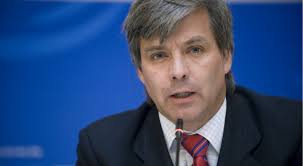By Andrew Warshaw
July 6 – Harold Mayne-Nicholls, who led the FIFA technical inspection team that evaluated the credentials of all nine candidates for the 2018 and 2022 World Cups, has been banned from all football activities for seven years in what many will construe as the start of a new crackdown by world football’s governing body in the light of the corruption scandal that has rocked the organisation and led to Sepp Blatter’s decision to stand down as president.
FIFA’s ethics committee gave scant detail of why the former head of the Chilean federation, who at one stage seriously considered bidding for the FIFA presidency, was banned except to say that he broke ethics rules, that the decision was taken following a hearing attended by Mayne-Nicholls himself and that more detailed information would only be given “after this final decision becomes effective.” Challenges to FIFA’s appeals committee and subsequently to the Court of Arbitration for Sport can typically take around one year.
Mayne-Nicholls, whose case had gone silent in recent months, was one of five officials under investigation over alleged wrongdoing during the World Cup bid process. He was being scrutinised over an apparent request for some of his family members to gain unpaid work experience at Qatar’s Aspire academy.
Mayne-Nicholls has always insisted the inquiry was a sham and that such conduct broke no rules either legally or morally. Back in December, in an exclusive interview with Insideworldootball, Mayne-Nicholls, who did not have a vote in the 2018 and 2022 ballot, criticised FIFA for spending so much “energy, money and time” on his case. But FIFA’s ethics committee presumably took the view that his behaviour called into question the integrity of his work though the length of the ban will come as a shock to many.
Bizarrely, he could hardly be accused of having favoured Qatar at the time of the vote, his team having questioned in no uncertain terms the idea of playing the World Cup in the searing summer temperatures of the Gulf. Qatar was duly placed bottom of the assessment table but the FIFA executive committee largely ignored the technical report when the country was controversially awarded 2022 in a landslide victory in December 2010.
It is understood that the requested Aspire programmes never took place even though Mayne-Nicholls had agreed to fund everything himself. The Qataris apparently wanted to avoid any conduct that could have been construed as influencing his assessment of their credentials as World Cup hosts.
The irony, of course, is that they were placed last in the table of suitability but a counter-theory is that this was because the request for placements at Aspire was turned down though there is no evidence to support this. Mayne-Nicholls has long campaigned – both at the time he led FIFA’s technical team and since – that playing the 2022 World Cup in summer was a non-starter and was vindicated when the tournament was switched to winter. He is known to have been disappointed not to have been invited to join the FIFA-appointed Task Force set up to hold discussions with the game’s various stakeholders over a compromise date.
In an email to Insideworldfootball shortly after today’s verdict, Mayne-Nicholls said he was not allowed to speak about the case. It would be of little surprise if he takes it to appeal.
Indeed on his twitter account, Mayne-Nicholls said he would be appealing and questioned why the announcement was made so early “as this may be modified by higher courts.”
Contact the writer of this story at moc.l1751731385labto1751731385ofdlr1751731385owedi1751731385sni@w1751731385ahsra1751731385w.wer1751731385dna1751731385

